- Center on Health Equity & Access
- Clinical
- Health Care Cost
- Health Care Delivery
- Insurance
- Policy
- Technology
- Value-Based Care
Pharmacy Policy Experts Describe Changes in Biosimilar Adoption Curve
Pharmacy experts from IPD Analytics explained the potential for authorized biologics, which would compete, potentially on the same price footing, with biosimilars.
“Authorized biologics” have been conceptualized as products that might one day compete with biosimilars, but although this hasn’t happened so far, the first authorized biologics are on the horizon, according to pharmacy analysts who spoke at the recent Academy of Managed Care Pharmacy (AMCP) Nexus 2021 meeting.
A biosimilar is a highly similar copy of a brand biologic, and an authorized biologic is the brand manufacturer’s attempt to compete on the same price level with the biosimilar without having to lower the price of the originator biologic.
One advantage of this strategy is that the manufacturer could maintain a high price of the reference product and promote it as a trusted brand that patients are already familiar with. At the same time, the authorized biologic, which would be the same drug as the original brand, could compete against biosimilars for a lower price.
“Today, we haven’t really seen brand companies have the motivation to bring these authorized products to market, but I think you’ll start to see a few in the future,” said Jeff Casberg, MS, RPh, a vice president of pharmacy for IPD Analytics.
Casberg and Leslie Fish, RPh, PharmD, also a vice president of pharmacy at IPD Analytics, discussed trends in biosimilar marketing and payer policies toward these agents in a joint presentation at the AMCP meeting.
First Authorized Biologics
One of the first authorized biologics to emerge would likely be a version of the insuline glargine product Semglee, which has been marketed as a new drug in the United States for several years but recently won FDA approval as a biosimilar and interchangeable form of Lantus, a blockbuster insulin drug from Sanofi.
The makers of Semglee, Biocon Biologics and Viatris, aim to market the drug as an interchangeable at a 5% discount to Lantus and as an authorized biologic at a 65% discount to Lantus. In addition, Novo Nordisk, maker of the reference insulin aspart product Novolog, is expected to try to bring an authorized biologic for that drug to market, Casberg said.
The arrival of authorized biologics will roughly coincide with the appearance of interchangeable biosimilars. These agents are like biosimilars in that they are highly similar to the reference, or brand, product, but they have undergone additional switching studies to ensure that clinical outcomes are the same for patients regardless of whether they switch several times between the reference and biosimilar products.
The chief difference between an interchangeable and a biosimilar is that a pharmacist cannot automatically dispense a biosimilar at the pharmacy counter without first notifying the prescribing physician.
In theory, pharmacists could also dispense authorized biologics at will because they would come from the same factory as the reference product.
“Authorized biologics are interchangeable. They are the same drug, and we don’t call them 'authorized biosimilars.' We call them authorized biologics because calling them authorized biosimilars would suggest biosimilars aren’t quite the same drug, so we call them authorized biologics,” Casberg said. So far, 2 biosimilars have been approved as interchangeables in the United States, Semglee and Cyltezo, which is a biosimilar of Adalimumab. Both approvals were granted in 2021.
Biosimilar Acceptance
Biosimilars have been available in the United States for 6 years, but their acceptance has been battered by reference drug manufacturer competition, payer policies that have been slow to promote the use of biosimilars, and insufficient education about biosimilars, which has contributed to physician and patient resistance toward using these agents, according to Fish.
Then there’s the COVID-19 pandemic, which has put some slack into the FDA’s biosimilar review and approval process. “When the pandemic arrived, the first thing that happened was that the clinical trials for biosimilars were delayed or postponed, or actually some even stopped totally. You could not get patients in to see their doctors,” she said.
“The FDA had to take all the people who looked at all the biosimilar data and put them into COVID-19 medication review; but the next thing, which was important for all medications that are in the pipeline, is that the FDA could not get into plants to do manufacturing inspections. In fact, that’s still delayed,” Fish said.
That said, there are many success stories of biosimilars that have captured significant market share from reference products, she said. From mid-2019 to mid-2021, biosimilar forms of rituximab took a 53% share of the market away from the originator brand, Rituxan.
During that same period, bevacizumab biosimilars gained a market share of 68% vs 4% in mid-2019. This trajectory was also seen for trastuzumab biosimilars, which achieved a market share of 68% by mid-2021, up from 4% in mid-2019.
Cumulative savings in the trastuzumab market, as a result of these lower-cost entrants, amounts to $2.5 billion, Fish said.
How Health Care Institutions Can Leverage Biosimilars to Generate Savings
August 17th 2022On this episode of Managed Care Cast, Ryan Haumschild, PharmD, MS, MBA, from Emory Healthcare and the Winship Cancer Institute, explains the evolution of biosimilar pharmacoeconomics and the different strategies that health care institutions can implement to reap the benefits of biosimilar savings.
Listen

